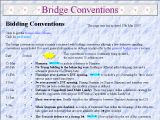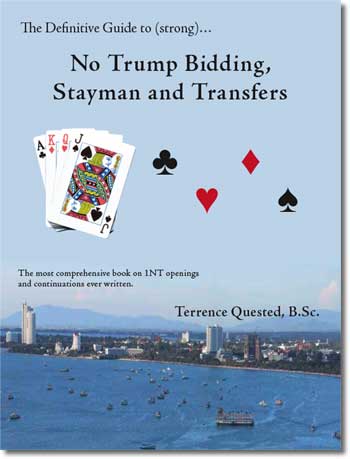Mon 31st 1st
Bob S & Bill P 60% 2nd Hans V &
Wed 2nd 1st Janne & Hans V 64% 2nd Guttorm & Ivy 63%
Fri 4th 1st Dave &
| to news-sheet main page |
 |
||||
| to Pattaya Bridge home page |
|||||
 |
to bridge book reviews | to bridge conventions | to No Trump bidding | ||
| to bridge CD's and computer games and software | |||||
Bidding Quiz Standard
American bidding is assumed unless otherwise stated.
Hand A Hand B With Hand A partner
opens 1♣, you bid 1♦ and partner bids 1♠,
what do you bid?
♠ K53 ♠
Q109632
♥
KJ ♥ 764 With Hand B partner opens 1NT,
(a) what do you bid?
♦ A9876 ♦ J108 (b)
Suppose you transfer with 2♥, LHO bids 3♣, partner bids
♣ 96 ♣ 10 3♠ and
Systems on – systems
off? Board 20 from Monday 31st
Dealer: ♠
K1083 Table
A
West ♥ A763 West North East South
Both vul ♦ KQ8 1NT
♣ A9 2♥ all pass
♠
A52 N ♠
J7 Table B
♥ K5 W E ♥ 109842 West North East South
♣
KJ ♣
Q10853 2♠ pass 3♣ (2) pass
♠ Q964 4♠ (3)
♥
QJ
♦ 763
♣ 7642
And what happened? 4♠(W)*-4, 3♠(S)-2, 2♦-1,
2♥+1. 2♥-1 and 2♥-2.
The bottom lines.
-
It is up
to you if you play systems on or off after partner’s 1NT is overcalled/doubled.
-
I
personally prefer systems off unless something else is specifically agreed.
-
Common
sensible agreements are:
a) After
1NT –
b) After
1NT – 2♣, then
c) After
1NT – a higher overcall, then systems are off and play Lebensohl if you are
familiar with it.
Multi purpose transfers Board 26 from Friday 4th
In my book on “No Trump Bidding, Stayman and Transfers” I mention my
disdain for a transfer bid that can mean more than one thing – on page 117 I give details of two such treatments (Walsh
relays and Compressed transfers) where
the sequence 1NT - pass - 2♦ may or may not show a 5+ ♥ suit. On
the page I give a number of reasons why these treatments are unsound. Apparently the Swedish system of responses
to 1NT also has this ambiguity in this same sequence and this hand from Friday simply
demonstrates one of my many objections to the treatment.
Dealer: ♠
- Table
A
East ♥ Q82 West(B) North East South
Both vul ♦ Q632 - - 1NT pass
♣ AK9543 2♦ (1) 3♣ pass (2) all pass
♠
Q109632 N ♠
KJ87 Table B
♥ 764 W E ♥ AK West(B) North East South
♣
10 ♣
Q7 2♥ (1) 3♣ 3♠ (3) 4♣
♠ A54 4♠ (4) all pass
♥
J10953
♦ K
♣ J862
And what happened? 3♣ made +1, 4♠ made exactly. For some reason at the other two
tables E-W failed to obey the Law and needlessly competed to 5♠ when 5♣
is not making and 5♠* goes -1 or -2
depending upon the defence. There is a famous bridge quote - “the 5-level
belongs to the opposition” - and this hand is no exception. The
bottom lines.
-
Obey the
Law. – Note that this is a perfect example, both sides have 10 trumps and both
can (probably) make 10 t
-
A transfer
is a transfer – and not some nebulous bid that leaves partner in the
dark when the opponents interfere. Read page 117 of my book, maybe I’ll
translate it into Swedish?
Play Quiz
You are in 3NT with loads of entries, how do
you play ♦J53 opposite ♦A9876 for four t
Play of the suit Answer Board 12 from Friday 4th
Dealer: ♠
Q764 West North East South(A)
West ♥ AQ - 1♣ (1) pass 1♦
N-S vul ♦ J53 pass 1♠ pass 2NT (2)
♣ AJ84 pass 3NT all
pass
♠
AJ1082 N ♠
9 (1) promising 4+ ♣’s in their system.
♥ 10953 W E ♥ 8642 (2) What did you bid with
this South hand A
♣
532 ♣ KQ107 problem
but there really is no option but
♠ K53 the obvious 2NT, showing 11-12 points
♥ KJ and
balanced (and a ♥ stop).
♦ A9876
♣ 96
And what happened? Nobody made it and part of the answer to making it
(as Deep Finesse says you can) is the play of the ♦ suit. I witnessed one player playing the ♦3 from dummy to the ♦9 in hand and thus losing to the singleton ♦10, so making just 3 ♦’s and going one down. He later commented that
leading the ♦J would have worked, but is this the correct
play?
As requested, I put it in the suit play calculator on the website and it
has two significant lines:
[A] To make 4 t
[B] To make 3 t
As it happens, the initial best play for both lines is the same – play
the ♦9 from hand and let it run. In this actual
layout the ♦10 appears from West and then there are 4 easy ♦ t
And what
happened at the Pattaya bridge club? 3NT-1 twice, 2NT-1 and 2♠(W)*-2.
Current club championship standings
|
|
Gold Cup = Best 30 |
Silver Plate = Best 10 |
Bronze Medal = Best 5 |
|
1 2 3 4 5 6 7 8 9 10 |
1896.6 Janne Roos 1881.5 Hans
Vikman 1845.4 1790.6 1719.3 Bob Short |
674.5 673.4 649.3 633.8 619.9 Jeremy Watson 619.2 618.8 Bob Short 615.1 Lars Broman 611.3 Gerard Hardy 611.3 |
350.7 350.6 333.3 325.3 324.5 321.7 Bob Short 321.7 Jeremy Watson 321.0 Per Andersson 316.9 Terje Lie 316.1 Lars Broman |
Not much movement this week, except Ivy
consolidating her 1st position in the bronze.
Double with a 5-card major? Board 2 from Monday 31st
Dealer: ♠
Q92 West North East South
East ♥ A105 - - pass 1♥
N-S vul ♦ Q986
♣ Q72 3♠ (3) pass pass 4♥
all pass
♠
108543 N ♠
AJ76
♥ K W E ♥ J983 (1) I
don’t like this double for two reasons:
♣
A954 ♣ 86 b)
It has a 5-card major.
♠ K If you want to bid with this hand then
bid 1♠.
♥
Q7642 (2) A
free bid, showing 6-9 points and 4+ ♠’s
♦ AK5 (3) Obeying the Law.
♣ KJ103
And what happened? West has successfully pushed N-S in a non-making game.
Obviously he leads a ♠, but which one?
He led the ♠4 (4th best). Dummy played low and East naturally thought that partner had led low from an
honour and had ♠Kxxx and declarer ♠xx. He played the ♠J and the contract
made.
So what went wrong? My take is: -
a)
Don’t
double when you have a 5-card major (unless very strong).
b)
4th
best leads generally apply only to No trump contracts, and this deal is a good
example of why. Against a NT contract it will probably be OK to let South make a singleton ♠K,
but in a suit contract it was a disaster.
c)
Against a
suit contract I play that a low card lead promises an honour, regardless of
whether the leader has 3, 4 or 5 in the suit.
d)
With this
actual West ♠ holding, lead the ♠10 or the ♠8 against
a suit contract to deny an honour.
And
what happened at other tables? 4♥=
3 times, 2♥+2, 3♥=
and 3NT-2
♣ KJ10 all pass
♠ A109
♥
85 You are West, defending 5♠ and partner leads the ♥K.
♦ AJ943 You encourage and win the
second t
♣ 762 What do you lead at t
Dave’s Column
answer Board 5 from Wednesday 2nd
Dealer: ♠ KQJ86532 Book bidding
North ♥ 107 West North East South
N-S vul ♦ 6 - 4♠ pass pass
♣
A9
♣ KJ10 ♣ Q8543 You
encourage and win the second t
♠ A109 ♥A. What do you lead at t
♥
85
♦ AJ943
♣ 762
At the table West shifted to the ♣J at t
That was nicely played for +650 and left West momentarily
wondering if they should have saved in 6♥.
A few moments later he realized that they should have defeated 5♠. At t
And what happened at the Pattaya Bridge Club? 5♠*=,
4♠+1, 4♠=
twice, 2♠+2 and 6♠-2.
Dealer: ♠ 763
East ♥ 6 West North East South
E-W vul ♦ AQ98532 - - 4♥ all pass
♣
J3
♣
862
Dave’s 2nd
Column answer Board 6 from Wednesday 2nd
Dealer: ♠ 763 Book bidding
East ♥ 6 West North East South
E-W vul ♦ AQ98532 - - 4♥ all pass
♣
J3
♣
862 ♣ KQ9
♠ A9854
♥
93 You are East. Partner leads the ♦J and declarer plays
♦ J low from dummy. How do you hope to make 4 t
♣ A10754
What is your defensive plan?
When this hand was first played, North was one of the best woman players of all time – Rixi Marcus. She hoped her side would take one ♠, one ♦ and two ♣’s. But just in case East had opened with a very strong hand Rixi overtook with the ♦Q and shifted to the ♣3.
This was the only winning defence. South took East’s ♣K with the ♣A and returned a low ♣, North’s ♣J driving out declarer’s ♣Q. East could draw trumps but when he played a ♠ South rose with the ♠A and cashed the ♣10.
Note that had Rixi led the ♣J instead of the ♣3 South cannot return the suit from his ♣107 into East’s ♣Q9.
And what happened at the Pattaya Bridge Club? 4NT(W)-5, 5♥-2,
5♥-1, 4♠*-1,
5♦*-2 and 5♠*-3.
The bottom lines: -
- Lead
low from Hx when you won’t be regaining the lead to
push the suit through for a second time and partner will be returning the suit.
Bidding Quiz Answers
Hand A: 2NT. The ♥’s
may be a problem but with a balanced 11-12 and a guaranteed ♥ stop if there is a ♥ lead there really is no other sensible bid.
Hand B: (a) 2♥, a transfer to ♠’s in most sensible systems.
(b) 4♠ - obey the Law, partner has 4 ♠’s and 4♣
may (did) make. 4♠ also makes against non-perfect defence.


